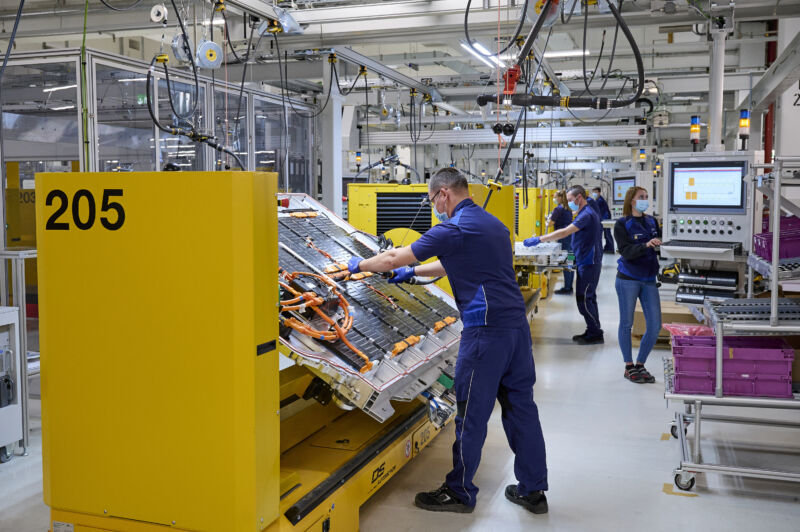The auto industry is pessimistic about 2030-2040 EV adoption timelines

BMW
50 {1668a97e7bfe6d80c144078b89af180f360665b4ea188e6054b2f93f7302966b} of all new automobiles and mild vehicles marketed in the US in 2030 ought to be zero-emissions automobiles, according to the White House’s local weather targets. California has set 2035 as the cutoff day for a ban on new gasoline- or diesel-driven cars within just the state’s borders. 2040 appears like the drop-useless day for new fossil gas motor vehicles in some of Europe—not to point out a really formidable date of 2030 in the United Kingdom—and automakers on all continents are preparing all-electric lineups as they start out to sunset internal combustion engine solution strains.
But a study of the car sector done by ABB Robotics and Automotive Producing Alternatives finds some pessimism about no matter if people goals will be achievable. When asked if “it is real looking to shift to 100 percent electric powered car production to satisfy the various regional targets from 2030 to 2040,” only 11 p.c stated, “Of course, unquestionably” less than 10 per cent of European respondents considered the targets ended up real looking, as opposed with 12 p.c in North The us and 17 percent in Asia.
One more 28 per cent mentioned, “Yes, but it won’t be uncomplicated.” That left far more than 50 percent of study respondents believing that 2030–2040 is too shortly for a shift to totally electric powered fleets. Forty-one particular {1668a97e7bfe6d80c144078b89af180f360665b4ea188e6054b2f93f7302966b} mentioned, “Probably, but not by the focus on dates,” leaving just 18 percent who could under no circumstances see the end of the interior combustion motor.
People today operating at tier 2 automotive suppliers had been the most optimistic—more than 50 {1668a97e7bfe6d80c144078b89af180f360665b4ea188e6054b2f93f7302966b} believed a switch to all-EV manufacturing would be feasible, even if not by 2040 by contrast, only a 3rd of respondents in other teams thought this was probable. (OEMs, design and engineering companies, tier 1 suppliers, tier 3 suppliers, application and IT services, and logistics ended up between the other industries consulted for the survey.)
Unsurprisingly, the most important impediments to shifting to 100 {1668a97e7bfe6d80c144078b89af180f360665b4ea188e6054b2f93f7302966b} EV output had been source chains and charge. Adapting to new battery provide chains was the number one reply at 19 p.c, and we are previously looking at this effect—look at how Toyota’s meager battery supplies have severely constrained its development of EVs and contrast that with how Ford secured sufficient battery contracts to triple generation of the Mustang Mach-E and double output of the F-150 Lightning in 2023.
Some of the issues mirror these of consumers—just as new EVs are noticeably more highly-priced than likewise sized and outfitted gasoline-burners, constructing new EV production facilities necessitating loads of funds investment (16 percent) was the 2nd-most commonly outlined barrier to shifting to 100 percent EV manufacturing.
Other issues incorporate supplies of uncooked materials (or shortages thereof) and a absence of infrastructure, followed by a absence of grid capability, a absence of green vitality, and a lack of charging infrastructure for EVs. Uncertainties in excess of desirability, a lack of need, and the superior price of acquiring a new EV ended up also stated as motives for pessimism.
The industry respondents have been also asked what they saw as the biggest one impediment to EV adoption. A lack of charging infrastructure topped the record at 26 p.c. But the substantial charge of a new EV was cited by 17 {1668a97e7bfe6d80c144078b89af180f360665b4ea188e6054b2f93f7302966b}. Interestingly, consumer resistance to EVs was predicted to be a greater variable than price tag between people surveyed in North The usa versus Europe or Asia.
The fantastic news is that 80 per cent of all those surveyed believed that reaching sustainable automobile manufacturing would be doable, despite the fact that 51 {1668a97e7bfe6d80c144078b89af180f360665b4ea188e6054b2f93f7302966b} reported, “Indeed, but it will never be effortless,” and a further 29 per cent stated it would be possible “but with excellent issues.”